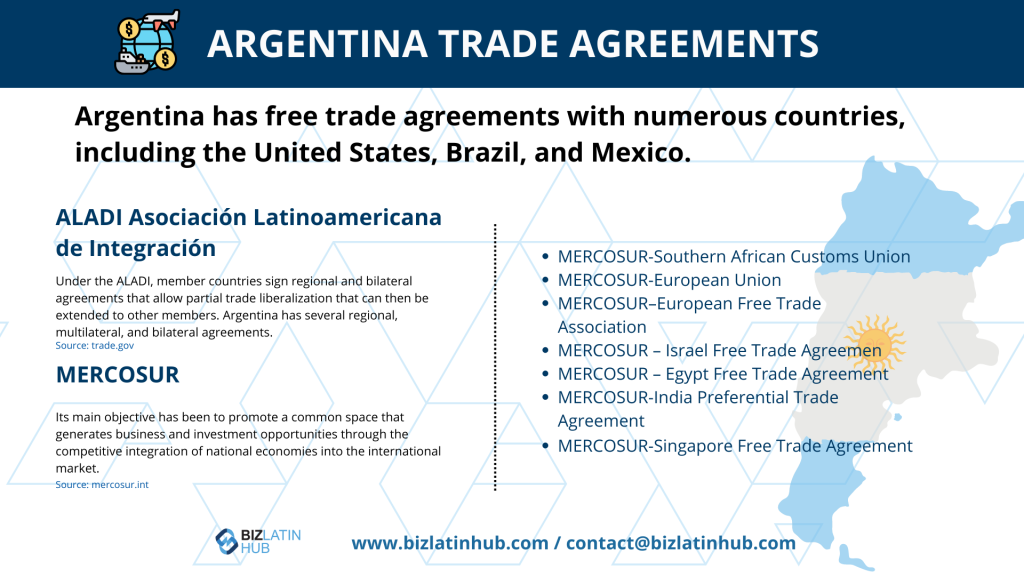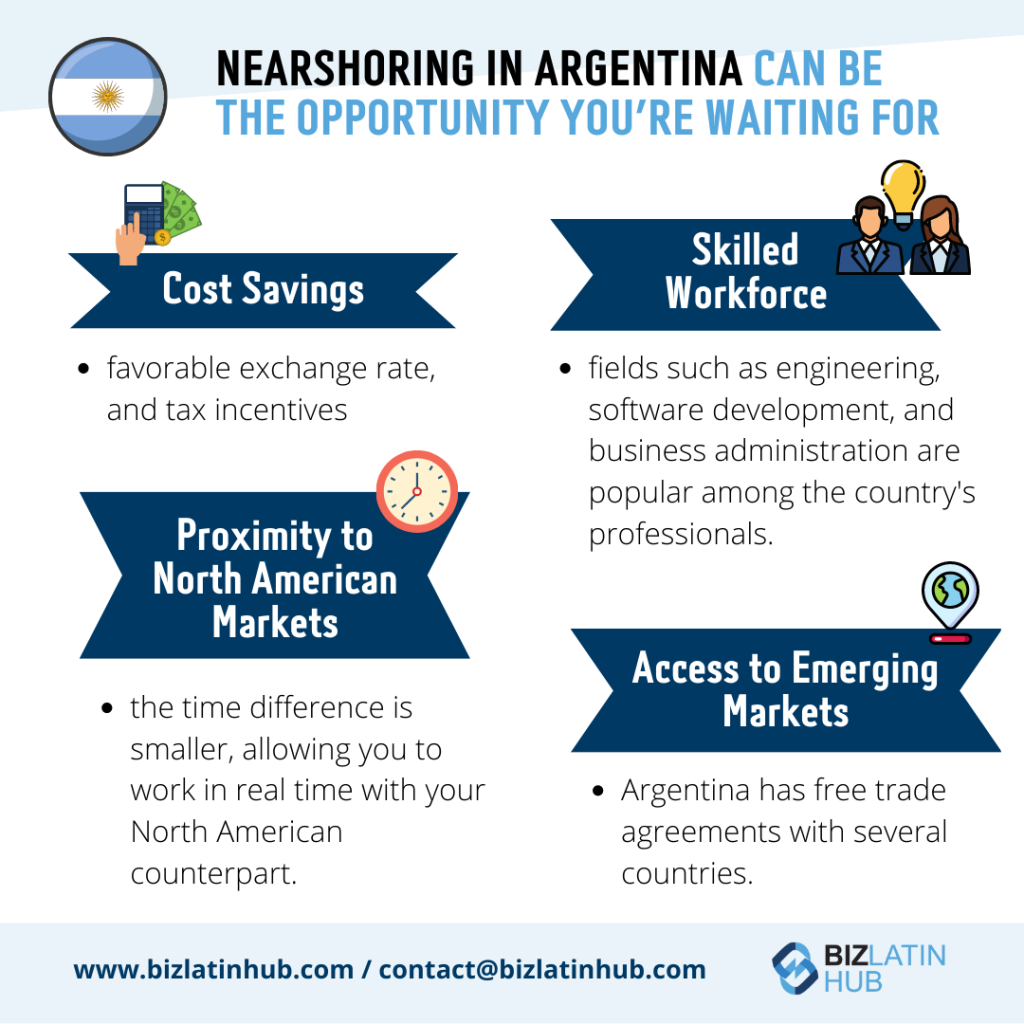In today’s interconnected global economy, businesses are continuously striving to enhance efficiency, cut costs, and broaden their markets. Nearshoring has emerged as a prominent solution for companies aiming to achieve these objectives. Within Latin America, one country stands out, with an uptick of interest in nearshoring in Argentina. This may involve learning how to incorporate a company in Argentina.
It has never been a better time to expand into the country with a new administration, making nearshoring in Argentina ever more promising. The country is growing fast and looking to the future. With GDP (PPP) now standing at USD$1.7tn, there’s ample opportunity to utilize this growing market for your business needs.
Biz Latin Hub can help you to set up a business, advise on your current operations, and assist in all of your accounting, legal, and hiring needs in the region, including nearshoring in Argentina. All of the services we provide are here to advise and support you through the medium to long term, ensuring your decision to start or maintain operations in the country are successful and beneficial for you and your business.

Why consider nearshoring in Argentina?
Argentina has several advantages that make it an attractive destination for nearshoring. First and foremost, the country has a highly educated and skilled workforce.
Argentina has a strong tradition of higher education, with several prestigious universities offering degrees in fields such as engineering, software development, and business administration. The country also has a young population with a high literacy rate, where more than 99% of the population are able to read and write. Additionally, Argentina currently has the highest English proficiency score among the 20 LATAM countries analyzed.
Another advantage of nearshoring in Argentina is the country’s favorable business environment. The government has implemented various policies to encourage foreign investment and business expansion. There are free trade agreements with numerous countries, including the United States, Brazil, and Mexico. Additionally, the country has established special economic zones that offer tax breaks, streamlined regulations, and other incentives to businesses that set up operations there.
Argentina’s strategic location is another factor that makes it an appealing destination for nearshoring. The country is located in the southern cone of South America, with access to both Atlantic and Pacific Ocean ports. Its time zone is also compatible with North American markets, making real-time collaboration possible.
Finally, Argentina has a vibrant and diverse culture that makes it an enticing market for businesses and employees alike. The country is known for its rich history, music, and cuisine, with its major cities home to a thriving arts and culture scene.
5 key points about nearshoring in Argentina
While Argentina offers many benefits, it is important to understand the country’s business culture and legal environment. Here are some tips for doing business in this unique location:
- Build Relationships.
- Understand the Legal Environment.
- Be Prepared for Bureaucracy.
- Embrace the Culture.
- Focus on Sustainability.

.
1. Build Relationships
Building relationships is critical when doing business in Argentina. The country has a strong culture of personal relationships, and business deals often depend on trust and rapport. It is essential to take the time to establish personal connections and build trust with potential business partners.
2. Understand the Legal Environment
Argentina’s legal environment can be complex, and companies must ensure they comply with all laws and regulations to avoid legal issues. It is advisable to work with a local legal counsel who can help navigate the legal landscape.
3. Be Prepared for Bureaucracy
Like many countries in Latin America, Argentina has a reputation for bureaucracy, and companies need to be prepared for delays and red tape. It is essential to plan for extra time in the business process and to be patient with administrative procedures.
4. Embrace the Culture
Argentina has a rich culture and history, and it is important to embrace and respect the local customs and traditions. This includes learning some basic Spanish and understanding the country’s social norms.
5. Focus on Sustainability
Sustainability is a growing concern in Argentina, and companies that prioritize environmental and social responsibility will find it easier to do business there. Companies should focus on sustainable practices, such as reducing waste and carbon emissions and supporting local communities.
5 Benefits of Nearshoring in Argentina
The benefits of nearshoring in Argentina are the following:
- Cost Savings.
- Skilled Workforce.
- Proximity to North American Markets.
- Access to Emerging Markets.
- Favorable Business Environment.
1. Cost Savings
Having business operations in Argentina can offer significant cost savings compared to operating in more developed countries. The country’s lower labor costs, favorable exchange rate, and tax incentives can all help reduce operational costs.
2. Skilled Workforce
Argentina’s highly educated and skilled workforce can help businesses achieve their goals more efficiently. The country produces graduates in fields such as engineering, software development, and business administration, and its workforce is known for its creativity and innovation.
3. Proximity to North American Markets
Argentina’s location in the southern cone of South America offers proximity to North American markets.
This means that businesses can work in real-time with their North American counterparts, reducing communication delays and improving collaboration.
4. Access to Emerging Markets
Argentina has free trade agreements with several countries, including Brazil and Mexico, which are emerging markets with significant potential for future growth.
Nearshoring in Argentina can provide businesses with access to these markets and help them expand their reach.
5. Favorable Business Environment
Argentina has implemented various policies to encourage foreign investment and business expansion.
The country has established special economic zones that offer tax breaks, streamlined regulations, and other incentives to businesses that set up operations there.
Additionally, the government has enacted reforms aimed at improving the ease of doing business in the country.
Nearshoring in Argentina can be the opportunity you’re waiting for
Nearshoring also offers significant benefits for businesses looking to expand their operations globally.
With its highly educated and skilled workforce, favorable business environment, and strategic location, Argentina is well-positioned to become a hub for nearshoring in the region.
By embracing the local culture and understanding the legal environment, businesses can successfully navigate the challenges of doing business in Argentina and utilize the enormous potential the country offers.
FAQs on Nearshoring in Argentina
1. What to do when nearshoring in Argentina?
- Build Relationships.
- Understand the Legal Environment.
- Be Prepared for Bureaucracy.
- Embrace the Culture.
- Focus on Sustainability.
2. What is nearshoring in Argentina?
Nearshoring in Argentina refers to the practice of outsourcing business processes or services to companies located in Argentina, particularly those that are geographically close to the business’s home country. It involves transferring tasks or projects to a nearby country, often in the same time zone or with minimal time difference, rather than outsourcing them to a distant location.
3. How does nearshoring in Argentina compare to offshoring in terms of cost?
Nearshoring to Argentina offers competitive prices and proximity to the United States, making it a cost-effective alternative to offshoring.
4. How to apply nearshoring in Argentina?
- Assess Needs: Evaluate which processes or services can be nearshored based on requirements and feasibility.
- Research Partners: Identify potential nearshore partners in Argentina with relevant experience and expertise.
- Establish Communication: Set up clear communication channels for effective collaboration and project management.
- Define Expectations: Clearly outline expectations, goals, and deliverables for the nearshored project.
- Monitor Performance: Continuously monitor partner performance and provide feedback to ensure alignment with standards and objectives.
5. Are there any time zone advantages when nearshoring in Argentina?
Yes, nearshoring in Argentina it means you are on a similar time to much of North America.
Biz Latin Hub can assist you with nearshoring in Argentina
At Biz Latin Hub, we offer comprehensive market entry and back-office solutions in Brazil, the rest of Latin America, and the Caribbean.
We specialize in a range of services, including nearshoring in Argentina, as well as hiring and PEO, accounting and taxation, company incorporation, and corporate legal advice.
Our offices are located in major cities across the region. In addition, we have established partnerships in numerous other markets, providing our clients access to an extensive network of resources.
This extensive coverage makes us well-equipped to support market entry and cross-border operations across multiple countries.
Get in touch with us today to learn more about our services and how we can assist you with your business endeavors in Latin America and the Caribbean.






